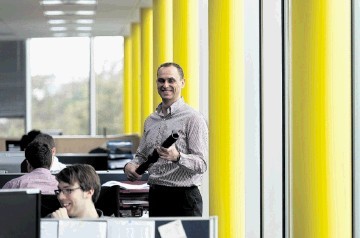
When recent research indicated that the oil and gas industry was facing the prospect of finding 120,000 new recruits in the north-east in the next 10 years, it highlighted the scale of the task facing those on the frontline.
The headline-grabbing figure in the PricewaterhouseCoopers study underlined the familiar message about an urgent need for skilled professionals to service demand and reinforced the challenges looming for the sector. But with every challenge comes an opportunity.
For Tony Laplante, engineering manager of the well intervention department of Hunting Energy Services at Portlethen, the job of filling the skills gap is one he relishes.
Now heading a department which includes pressure control equipment, downhole tools and mechanical plant, Tony became part of the Hunting group when his employer Welltonic was acquired by the firm in 2009.
Hunting is in the midst of a recruitment drive which will take its new intake of staff in the north-east past 100 for 2012 alone. Engineering, particularly research and development, is at the heart of that expansion, with 30 engineers already employed in a rapidly growing department at the Badentoy Industrial Estate.
Tony explained: “Hunting has an excellent reputation as a pipe company, but there is now far more to the firm. The engineering capability has been heavily invested in and strengthened and that presents tremendous opportunities for the team. We’re constantly working to find new and innovative solutions and that is what makes the job so interesting.”
Tony served his apprenticeship as a draughtsman with engineering firm John M. Henderson in Aberdeen before moving into the oil and gas sector with Baker Oil Tools, working in completion design, as a 21-year-old in the late 1980s.
Now 44, he has seen incredible changes in the industry, but believes it is now more attractive than ever before. Next year marks the 40th anniversary of the Offshore Europe exhibition and the recent PWC report predicted in excess of 40 years of activity in the north-east thanks to advances in technology, recent deepwater finds and improved field economics, as well as a bright future beyond then due to transferable skills and the creation of a new Energy Hub.
Tony said: “When I left my first job to move into oil, my boss told me the industry wouldn’t last. What we have seen since then is the business evolving, expanding and servicing new and emerging sectors. The potential for anyone coming into this line of work is enormous, particularly at a company like Hunting, where personal development is so important.
“It is also a unique environment because of the variety of work in which we are involved, with surface and downhole technology as well as the mechanical plant side of the business. Typically, you pick a single discipline to concentrate on, but here we have far more scope.”
Career development is something Tony can speak on with great authority, having worked for a number of firms in the north-east and taken time out to gain a degree.
He added: “I was fortunate to be able to complete a sandwich degree over the course of four years, which involved rotations of six months’ work and six months at university. At Hunting, we have people attending college to complete HNCs and HNDs, as well as others working towards degrees.
“The industry never stands still and we always encourage members of our team to keep progressing. It’s an approach that benefits the company and also the individual, so everyone wins. One of our engineers celebrated 21 years with Hunting recently, which is a sign of the excellent environment here. We recruit at all levels, from the most experienced in the industry to those just starting out. It is important for any organisation to have the right blend.”
